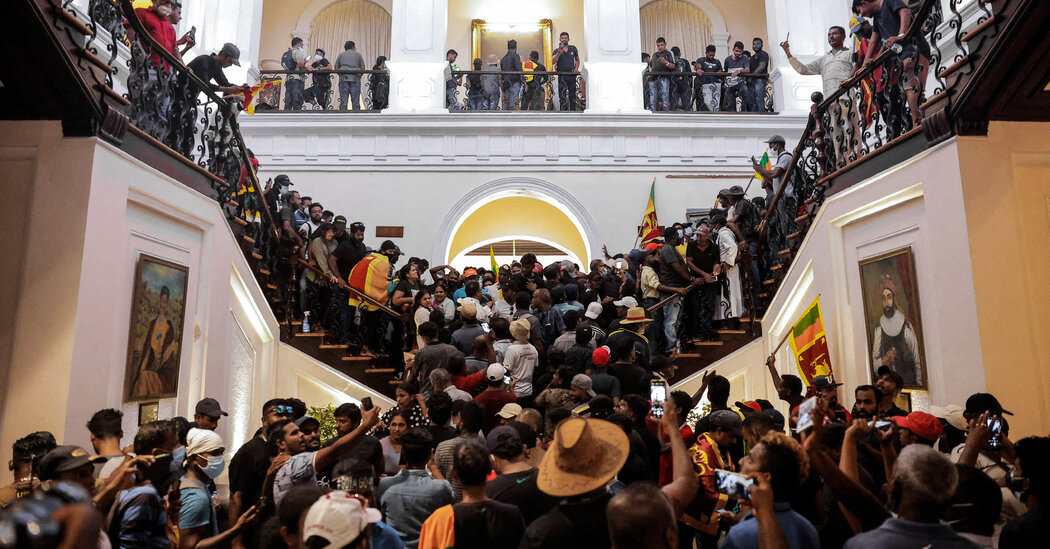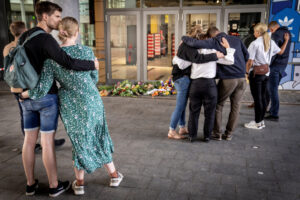Good morning. We’re covering the resignation of Sri Lanka’s president, election results in Japan and Russia’s bombardment of Donetsk, Ukraine.
The mandate will give the lawmakers a new chance to pursue Abe’s long-held ambition of revising a clause that renounces war in the country’s pacifist Constitution.
Better Understand the Russia-Ukraine War
The election results were also a clear sign that Abe, Japan’s longest-serving prime minister, remained a guiding political force, even though he resigned in 2020. But without him, the will to push revisions through a difficult parliamentary process could wane.
Context: The plan to amend the Constitution has long been unpopular with the public. With inflation pressures mounting, the yen weakening, the war in Ukraine heightening fears of energy shortages and coronavirus infections rising, it could be a harder sell than ever.
Assassination: Here is what we know so far. The police have released little information about the suspect and his motives, but acknowledged that Abe’s security was flawed.
Russia bombards Donetsk
Russia has aggressively moved to take the entire Donbas region of Ukraine after seizing the Luhansk province last week. Over the weekend, it bombarded the five main towns and cities in neighboring Donetsk, the other province in the region.
At least 15 people were killed in Donetsk when a Russian missile hit an apartment complex in the village of Chasiv Yar. Rescue crews said that up to 20 people could still be trapped, including a 9-year-old boy. Here are live updates.
In the northeast, Russian forces also conducted attacks on the Kharkiv region. Last week, Russia established a civilian administration and unveiled a new flag in border areas under its control — a sign, analysts said, that Moscow plans to annex the territory.
Ukrainian officials estimate that Russia already occupies about 30 percent of the Kharkiv region.
Soldiers: Russia, desperate for recruits, has turned to cash incentives to bring in new fighters — often from impoverished minority groups.
Gas prices: President Biden is seeking a global price cap on Russian oil, a full European ban on which could raise U.S. gas prices to $7 a gallon.
Analysis: The war is becoming a contest of global stamina between Russia and the West.
THE LATEST NEWS
The G20 meeting
South Korea is known for its blazing broadband and innovative devices. But the country remains tethered to a buggy and insecure piece of software that was introduced 27 years ago and has since been abandoned by most of the world: Internet Explorer.
A ‘hot dog bus’ returns
Double-decker “hot dog buses,” nicknamed for their lack of air-conditioning, were once a daily feature of life in Hong Kong. But they’ve been out of commission for more than a decade.
Now, at least one has returned to the city’s streets, thanks to two pilots who pooled their savings to buy and restore the relic. When the pandemic cut their flight hours, they spent months scouring the internet for antique parts, watching old video clips to determine the correct font and placement of stickers and decals, and documenting the process on Instagram.
For onlookers, the bus is a trip of nostalgia, a portal to the 1980s and ’90s. When the pilots, Luca Tong and Kobee Ko, park it at a terminal by the harbor front, enthusiasts come aboard to marvel at it. “All my memories came back,” said one woman who used to ride hot dog buses in high school and who brought her 4-year-old son for the experience.
But the bus is also a memento of a happier time in the city, before pandemic restrictions and a sweeping political crackdown.
“Back then, there was freedom, money and a whole lot of warmth,” Tong, 35, said. “The bus has the feeling of Hong Kong at that time, but that feeling is disappearing from Hong Kong.”



